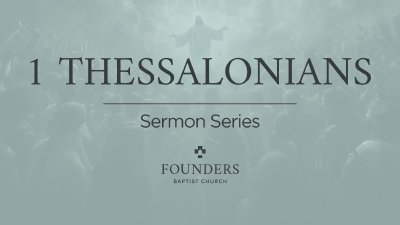Introduction:
Many years ago, there was a young man that I had privilege of leading to Christ while he was working for his uncle during the summer. His uncle was not a professing believer at the time, and his aunt was recent professor of faith in Christ.
His family remolded and sold houses, they had sold us our house, and they were working on a new project next door to us.
On the weekend he was scheduled to go back home, to southern California, he gave his life to Christ.
I had no time to disciple him.
He only had a very small amount of teaching that I had been able to pass on.
He was going home to an unbelieving father — one who was involved in false religion.
And in a short time, he was to leave for the Navy.
When Nathan left, I prayed for him and my only hope was that I knew that if his conversion was genuine — he was the Lord’s. The Lord would not let go of him.
Sometime later (I think it was a year), Nathan pulled up in my driveway. His back seat was full of theology books — and they were sound.
He had formed relationships with believers — first during his brief time back in California — then during his time in the Navy. He was proving to be a serious student of theology.
That experience will forever stand in my mind as an example of the sufficiency of God’s saving work in a person’s life.
The church at Thessalonica stands as a great testimony of the sufficiency of salvation.
It stands as a testimony of the sufficiency of the gospel, the sufficiency of Christ, and the reality of the indwelling Holy Spirit.
It stands as a testimony of the reality of the NEW NATURE.
From what we can gather from the book of Acts (Acts 17:1-15), the ministry of Paul in the city of Thessalonica was very brief.
His premature departure from that city left him concerned for the believers there, and after a short time, he sent Timothy back to see about their condition.
PAUL WRITES THIS LETTER AS A RESPONSE TO THE REPORT THAT TIMOTHY HAD GIVEN ABOUT THEM WHEN HE MET WITH PAUL IN CORINTH.
What Paul had learned was that the Thessalonians were generally doing well but were also struggling in some areas.
They didn’t have a clear understanding of what happens with believers who die before the coming of the Lord.
It’s clear that they had not fully expected the kind of suffering and persecution they were facing.
It appears they were struggling for personal holiness — a right view of what it means to live in light of the return of Christ.
DESPITE THOSE STUGGLES, PAUL IS ENCOURAGED AND HE ENCOURAGES THEM.
When you read this letter there are several words that we can mention that come to mind.
1. Affection — Deep affection. The kind of affection that parents have for children (chapters 2 and 3).
2. Thankfulness — In the case of this letter, the thankfulness is specific. It is thankfulness for the spiritual fruit. It is thankfulness for spiritual steadfastness and growth. It is thankfulness for clear and undeniable evidences of genuine salvation.
To put it succinctly, it is thankfulness for God’s work in these people.
3. Longing and concern — Paul emphasizes, more than once, and in the strongest terms, that he desires to see these people face to face again. But until he can — and he prays that will be soon — he has still taken care of them and satisfied his concerns about them by sending Timothy to find out how they are doing and to bring him a report.
4. Instruction — We find instruction for doctrine and for duty. He addresses what they must know, and he addresses how they must live. He gives them vital truths to be sure that they are not uninformed, and he gives them commands meant to stir them to greater love, and holiness, and good deeds.
5. Encouragement — Paul doesn’t hesitate to tell them about the good that he and others see in them. He doesn’t hesitate to tell them about the power of their testimony. He is not afraid to command, he is not afraid to correct, but he is also not afraid to encourage — and it becomes plain that Paul LOVES to be an encourager.
Now, what I would have you think about tonight is the fact that this is not only the attitude, the atmosphere, that runs through this letter, THIS IS A MODEL FOR WHAT IT MEANS TO HAVE A REAL MINISTRY TO OTHER PEOPLE.





